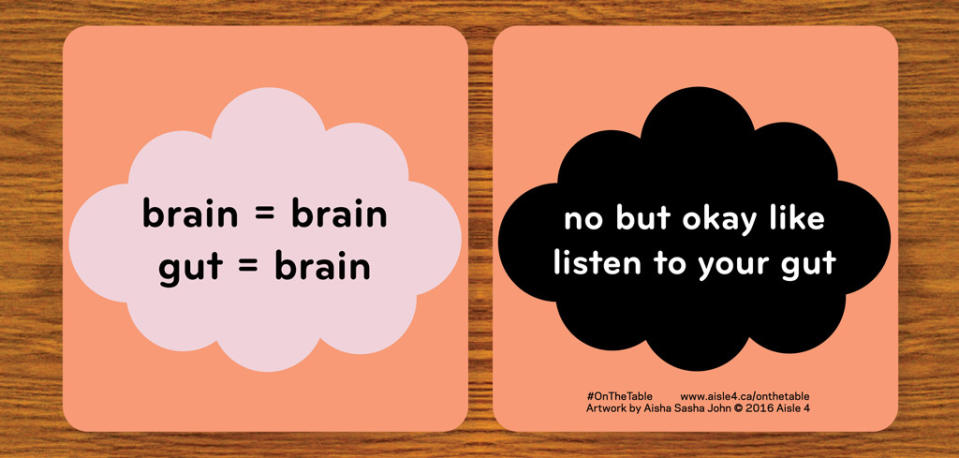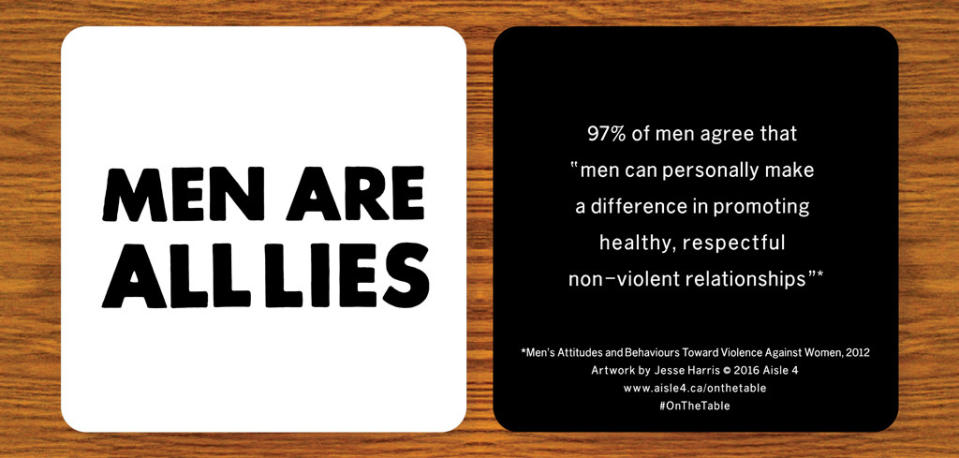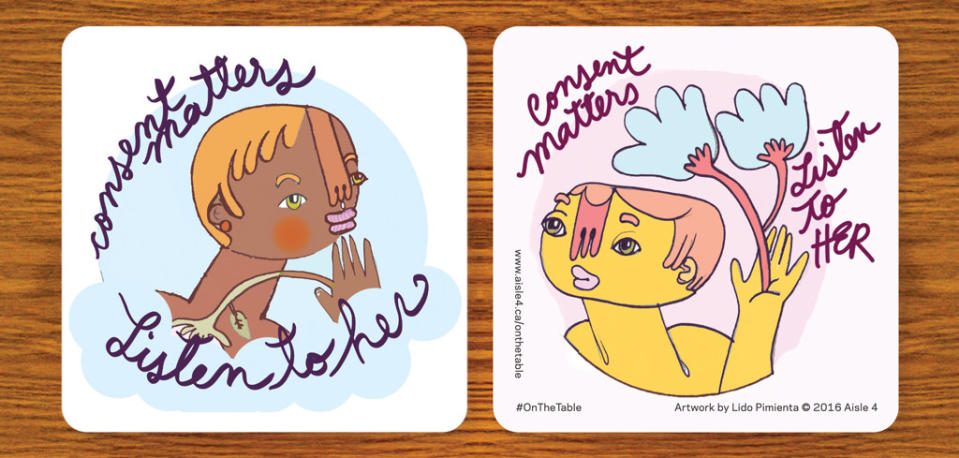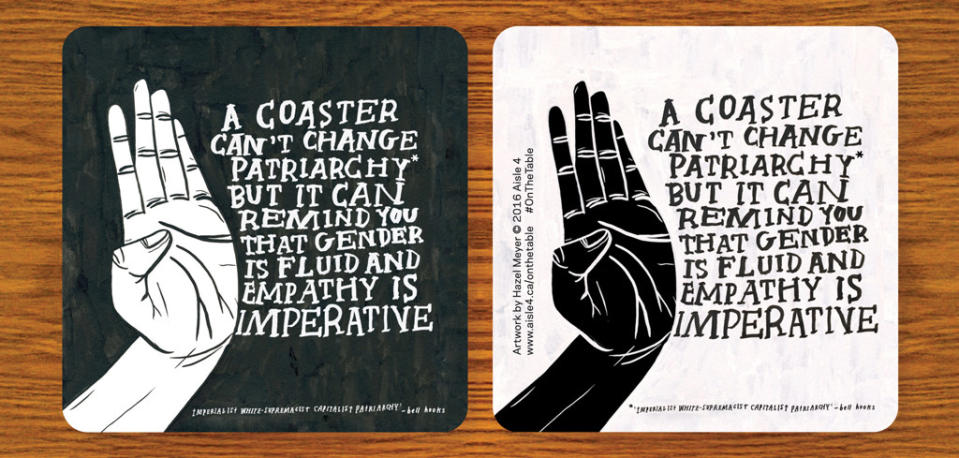'Angel shots,' cautionary coasters, and bartenders banding together: tackling sex assault at the tavern
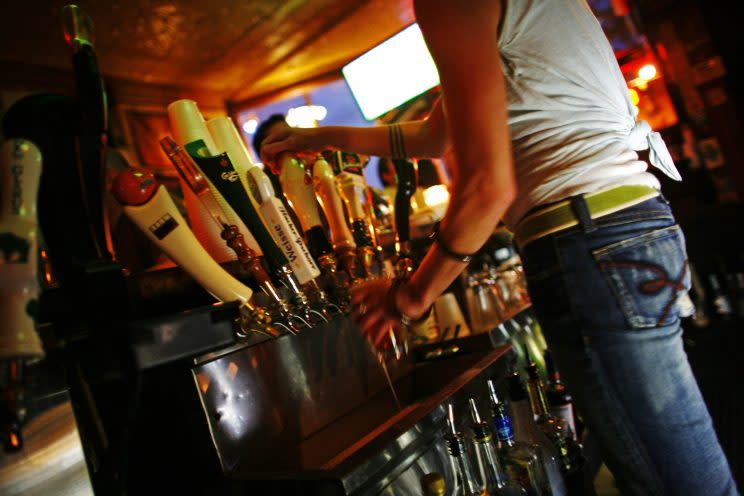
About nine years ago, Aja Sax was drugged at a bar in Victoria and sexually assaulted. Not long afterwards she was sitting at a different bar, trying to decide what to do with her drink.
“I remember being at the bar that I was a regular at and sitting there with my beer and wanting to go have a cigarette and not knowing what to do,” Sax told Yahoo Canada News.
The bartender let Sax stash her drink behind the bar for safety, but was dismissive about it. She realized that a woman who didn’t know the staff like she did might not ask at all.
The experience planted a seed. Now Sax, who is a bartender in Toronto, works to make bars safer for patrons and staff, pushing for training on sexual-assault prevention.
On Monday night, Bartenders Against Sexual Harassment (BASH) will meet at a Toronto bar to raise funds for the Dandelion Project, a plan to train bar staff on sexual assault and anti-assault procedures.
The event brings together some of the many efforts happening across Canada to make bars, nightclubs, and restaurants safer places.
Sexual assault is the only violent crime in Canada that isn’t declining in frequency, with StatsCan data showing that rates of the crime remain relatively unchanged from 1999 levels.
Discussion about safety and sexual assault in Toronto bars received new attention last month after two male staffers were charged with assaulting a woman at bar in the city’s Little Italy neighbourhood.
Measures like the Dandelion Project and BASH are a way to codify the work women have been doing for years to make themselves safer at bars, Sax says: watching drinks for each other, escorting people to their cars, and intervening when they suspect someone is at risk of being assaulted.
“Women have been self-policing for years,” Sax said. “We’ve been doing that for each other for decades. Someone needs to start doing it for us.”
Nationwide efforts
The cross-country work of activists, artists, industry professionals, and politicians on the issue of safety in bars covers the gamut from raising awareness of the issue to lobbying for mandated training on sexual-assault prevention for liquor servers.
Aisle 4, a Toronto-based art collective, partnered with four artists — Jesse Harris, Hazel Meyer, Lido Pimienta, Aisha Sasha John — for On The Table, which will put about 10,000 coasters at ten bars and events in the city during the Toronto Design Offsite Festival, which runs from Jan. 16 to 22.
“I think a lot of very small changes in perspective can happen when you’re sitting around chatting with friends,” Aisle 4 member Shannon Linde told Yahoo Canada News about the power of having a conversation-starting coaster on bar tables.
“It gives us this opportunity to open people’s eyes and then be open to what other people’s experiences are like. We are all better off if we start advocating about this.”
Aisle 4 worked with White Ribbon, which works to engage men in preventing violence against women, on the project.
“They’re very much approaching sexual assault from a very specific position of trying to educate boys and reengage with what masculinity means,” participating artist Hazel Meyer told Yahoo Canada News. Bars are a place for conversation, she said, and this should be one of the conversations that happens there.
Other groups are working on grassroots efforts to train bar and restaurant staff in spotting and preventing sexual assault.
In November the student-run bar at Ryerson University in Toronto put up signs similar to ones seen at a bar in the UK, advising patrons to ask a staff member for “Rachelle or Jennifer” if they needed help getting out of an uncomfortable or threatening situation.
One Florida restaurant put up a sign inviting any patron who feels like they’re in a situation they need to get out of to order an “angel shot” at the bar, alerting staff they need help to get to their vehicle, call a cab, or phone police.
At the eastern end of the country, the “angel shot” system would be of value in St. John’s the head of the St. John’s Status of Women Council told CBC News.
The value of the program is not just for patrons who use it, women’s council head Jenny Wright told the broadcaster. It also let’s bar guests and staff know their safety is important.
Activists in the city are also developing a version of the Safer Bars program initially developed by the Centre for Addiction and Mental Health and used in establishments across the country. And in Vancouver the Good Night Out campaign works with local nightclubs on assault-prevention measures.
There are also signs of action on the municipal and provincial level. Last September, Ontario’s government announced $1.7 million would go to train hospitality staff on preventing sexual violence in their workplaces.
In Toronto a motion was passed in November asking the province to add information on assault prevention to the Smart Serve training all Ontario servers are required to take.
But existing measures are voluntary and lack enforcement, Sax said. Training on assault prevention should be mandatory for all establishment staff, she said, and taken as seriously as the prevention of impaired driving is now.
“The choice has to be taken out of it, in my opinion,” she said. “It needs to be something like a Smart Serve card, where you need to be certified — and you don’t get to serve until you are.”


